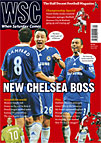 Martin del Palacio Langer reports on a Mexican defender whose family ties always make him the first name on the teamsheet
Martin del Palacio Langer reports on a Mexican defender whose family ties always make him the first name on the teamsheet
“How can a player say something when his team-mate misses a chance if he’s the one signing the pay cheques at the end of the month?” So did a former coach explain the awkward circumstances that exist inside a football club in Mexico’s second largest city. He’s talking about Juan Carlos Leaño, team captain and son of the president and owner of Tecos (Owls), officially known as Universidad Autónoma de Guadalajara. For generations, both club and institution – an ultra-conservative college – have been the personal fiefdoms of the Leaño family, one of the richest in the Jalisco region, whose influence goes way beyond the educational and football environments (Tecos players are not required to be students).
Tecos are by far the smallest team in Guadalajara, a city that contains the most popular team in the country, Chivas, and one of Mexico’s oldest established clubs, Atlas. In fact, Tecos are the worst supported top-flight club in the whole country, averaging an attendance of just 12,000 per match. And that figure is inflated by the matches against Mexico’s “Big Four” (Chivas, América, Pumas and Cruz Azul), whose fans fill the 25,000 seats of the small Tres de Marzo stadium every time they visit.
Founded in 1971 and promoted to the Mexican first division four years later, the team has made more headlines for their constant change of kits than their sporting achievements. They have won one league title, in 1993-94, but had eight shirt styles before settling on Croatia-inspired red and white checks.
The president of the club is Antonio Leaño, the vice-president is his brother Carlos, his son Antonio Jr is the financial manager and his nephew Antonio Canales Leaño is the administrative manager. But the one who makes all of the decisions is his youngest son, Juan Carlos, who also happens to be the captain of the team and an ever-present central defender. “It’s not written in stone anywhere, but he has to play,” says one former coach, who requests anonymity because “the Leaño family is very powerful in Mexican football and I don’t want to be blacklisted”. He continued: “If you don’t field him in the training sessions you get a phone call immediately from his father who asks you to clarify the reasons.”
Only one manager has defied the edict so far. Rubén Omar Romano led the team to one of their best seasons in recent history, reaching the quarter-finals of the summer 2001 tournament. But the following season, the team was less impressive, particularly in defence. The Argentinian coach soon decided young Juan Carlos wasn’t up to the task and left him on the bench. Romano’s previous record allowed him to keep his job for nine matches. But after losing against Tigres, he received the dreaded call: “play him or leave”. He left and was replaced by Omar Sandoval, whose only previous “achievement” was to have managed the team of a car dealership owned by the Leaños.
Since then, the central defender has played each and every match, bar injuries, and is soon to make his 200th first-team appearance. He has improved from the clumsy and confused defender who struggled on his first outings, but is still too slow by first division standards and is therefore usually partnered with a quality foreigner or surrounded by quick players who can make up for his lack of pace.
But that’s not all. For the past two years, the youngest of the Leaño family has taken most of the administrative decisions in the club, as the same anonymous source confirms. “He has the final word in all the money matters. He signs the cheques, decides if it’s possible to take an extra player to an away trip and agrees on the transfer fees and salaries of new signings. Nothing happens without Juan Carlos giving it his thumbs up.”
Every new mistake by Leaño leads to a flurry of criticism in the media, but the fact that very few people really care about Tecos has always suggested that nothing will change until Leaño decides to retire. Or maybe not. The club’s eternal lack of success has recently prompted the Leaños to consider an offer from betting tycoon Carlos Hank who would move the club to his base in the north-eastern city of Tijuana. Unless a “Juan Carlos Leaño clause” is included in the sale terms, an outlandish playing career might finally be coming to an end.
From WSC 266 April 2009